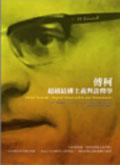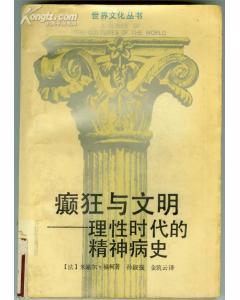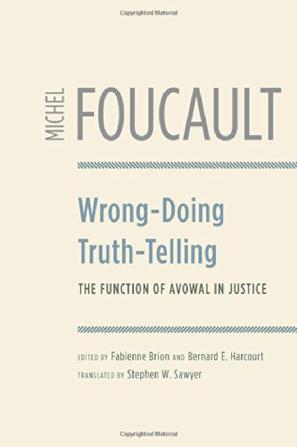-

瘋顛與文明
十八世紀末,當瘋顛被確定為一種精神病前,瘋顛與非瘋顛、理性與非理性,用一種躲躲閃閃的方式相互依存,相互交流;直到現代安謐的精神病世界建立,瘋顛與理性用以交流的一切期期艾艾、支離破碎的語詞被拋棄了,理性的靜默獨白成為精神病學闡述瘋顛的唯一語言,而深掘了兩者之間斷裂的鴻溝。傅柯在《瘋顛與文明》中所論述的正是「那種沈默(silence)的考古學」。 -

傅柯:超越結構主義與詮釋學
「本書提供了精確而綜合的觀點……我相信這本著作為聯繫美國和歐洲的思想開啟了新的境域」——傅柯(Michel Foucault) 「重點不是說了什麼,而是誰在說」 本書是兩位傑出學者聯手向傅柯的挑戰,也是迄今對傅柯學說歷程描述的最具深度的佳作。傅柯的傑出之處在於對考古學和系譜學的巧妙混用,從而獨創了一種有別於結構主義和詮釋學的理解人和社會的方法 ,即本書作者所謂的「詮釋解析法」。 本書的可貴之處有三。首先,傅柯學說對今日的影響已廣泛運用於各種權力論述,甚至及於網絡社會的研究,但是他如何能在當時瀰漫著現象學、結構主義以及詮釋學的氛圍中,開創新局,展開一場以「權力」為探索主軸的知識考古旅程,卻難以為識者所悉,本書是最好的入門手冊。 其次,兩位作者學域含括廣泛,德福雷斯鑽研於現象學、詮釋學,拉比諾則長於結構主義,所論所述,剛好切合了當時傅柯所處的學術氛圍,誠如中譯者所言,「復活」了傅柯學說。 最後,本書另收入了哈伯瑪斯與傅柯的爭議評析,哈伯瑪斯所提出的公共領域、合法化問題,今日仍是社會學理論的主流,他與傅柯對「啟蒙」的論爭,不啻勾勒出當代西方哲學的探索路徑。 -

The Order of Things
When one defines "order" as a sorting of priorities, it becomes beautifully clear as to what Foucault is doing here. With virtuoso showmanship, he weaves an intensely complex history of thought. He dips into literature, art, economics and even biology in The Order of Things, possibly one of the most significant, yet most overlooked, works of the twentieth century. Eclipsed by his later work on power and discourse, nonetheless it was The Order of Things that established Foucault's reputation as an intellectual giant. Pirouetting around the outer edge of language, Foucault unsettles the surface of literary writing. In describing the limitations of our usual taxonomies, he opens the door onto a whole new system of thought, one ripe with what he calls "exotic charm". Intellectual pyrotechnics from the master of critical thinking, this book is crucial reading for those who wish to gain insight into that odd beast called Postmodernism, and a must for any fan of Foucault. -

The Birth of the Clinic
The Birth of the Clinic(2003) 中文名:福柯《临床医学的诞生》英文版 Author: Michel Foucault Publisher: Routledge Year: 2003 Language: English Imagecount: 238 书籍简介:本书是法国当代著名学者、思想家福柯的鼎力之作。它运用考古学、系谱学的方法研究医学史,不但填补了以往研究的空白,而且书中运用的研究方式和表达的思想对传统观念提出了挑战。在此意义上,本书既是一本医学史著作,同时又超越了医学史的范畴。作为一本学术书,它包含深刻的思想和犀利的见解,对西方乃至全世界的学术研究都产生了重要影响,绝对值得一读再读。 -

癫狂与文明
就是《疯癫与文明》的一个早期译本 -

Wrong-Doing, Truth-Telling
Three years before his death, Michel Foucault delivered a series of lectures at the Catholic University of Louvain that until recently remained almost unknown. These lectures—which focus on the role of avowal, or confession, in the determination of truth and justice—provide the missing link between Foucault’s early work on madness, delinquency, and sexuality and his later explorations of subjectivity in Greek and Roman antiquity. Ranging broadly from Homer to the twentieth century, Foucault traces the early use of truth-telling in ancient Greece and follows it through to practices of self-examination in monastic times. By the nineteenth century, the avowal of wrongdoing was no longer sufficient to satisfy the call for justice; there remained the question of who the “criminal” was and what formative factors contributed to his wrong-doing. The call for psychiatric expertise marked the birth of the discipline of psychiatry in the nineteenth and twentieth centuries as well as its widespread recognition as the foundation of criminology and modern criminal justice. Published here for the first time, the 1981 lectures have been superbly translated by Stephen W. Sawyer and expertly edited and extensively annotated by Fabienne Brion and Bernard E. Harcourt. They are accompanied by two contemporaneous interviews with Foucault in which he elaborates on a number of the key themes. An essential companion to Discipline and Punish, Wrong-Doing, Truth-Telling will take its place as one of the most significant works of Foucault to appear in decades, and will be necessary reading for all those interested in his thought.